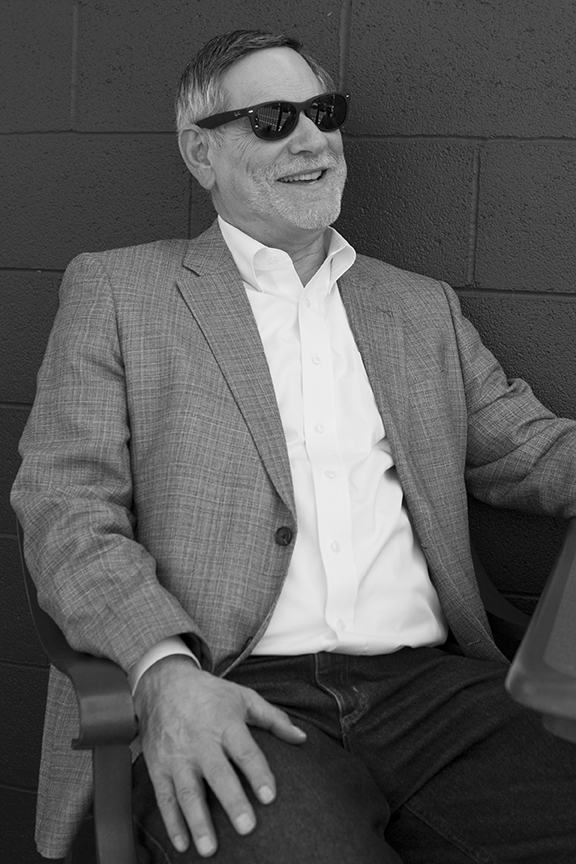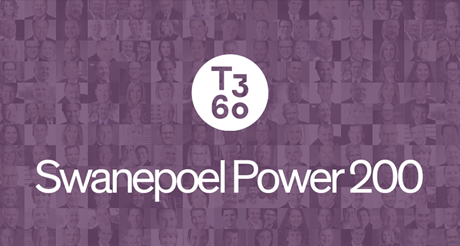Coffee Break with James Weichselbaum
Jim Weichselbaum, Broker/Owner of RE/MAX 100, Inc., has quite the diverse and colorful background. He's done carpentry, framed houses, poured foundations, tied steel, and even shoveled concrete while working 12-hour shifts on coal silos in the Cordero Rojo Mine! Clearly, he's no stranger to hard work and determination.
Jim, the recipient of the prestigious Broker Manager of the Year award at this year's Excellence Awards, recently sat down with us at Village Roaster - a locally owned coffee spot in Lakewood that Jim specifically recommended for our meeting. Over cups of iced coffee and green tea, Jim shared with us his extensive work experience that spans multiple states and industries, how he got into the real estate business, his thoughts on REALTOR® education, his paternal managing style, and much more. ► Psst... After you enjoy the full interview, be sure to watch Jim answer even more questions in the Xpresso Round Video!
DMAR: Tell us about yourself and how you got into the real estate industry.
 James: I began building and developing in the 1970’s in Vail, Colorado until interest rates skyrocketed in 1980. Obviously, at that point, my partner and I decided to get out of that market because everything was slowing down. We moved to Denver thinking we would build there but, of course, interest rates were high in Denver as well, so we built one house and that was it. Construction was rather stagnant, builders were dumping inventory, and mortgage interest rates were as high as 17 to 18 percent.
James: I began building and developing in the 1970’s in Vail, Colorado until interest rates skyrocketed in 1980. Obviously, at that point, my partner and I decided to get out of that market because everything was slowing down. We moved to Denver thinking we would build there but, of course, interest rates were high in Denver as well, so we built one house and that was it. Construction was rather stagnant, builders were dumping inventory, and mortgage interest rates were as high as 17 to 18 percent.
My friend suggested I get my real estate license. I thought it was a good idea and I was also curious to find out why I was paying these brokers to sell our new product. I got a license, kind of as a lark, but then realized that it was quite fun. Eighteen months later, I bought a RE/MAX franchise and opened the doors. When I started my company, everyone thought I was nuts because I hadn’t been in the business for very long and we didn’t have many sales at the time. I leased the space where we are now at 6th Ave. and Kipling, and started off with 2,800 square feet. I had a lot more desks than I did brokers, but I had confidence. I’ve now been here for 33 years.
I had a lot more desks than I did brokers, but I had confidence.
D: Describe your job.
J: As the managing broker for RE/MAX 100, I make sure that we offer training, provide sales skills, and review contracts. The average experience of our brokers is 20+ years, so the management is pretty easy. I’m not looking for a hundred person office anymore. In our peak we had about 95 brokers, but I prefer to have 50 brokers who are high-quality, good producing people. I want people I can trust. We currently have 50 brokers and we outperform other brokerages of that size. They’re not only good people, but also good at what they do. That’s why we’ve won numerous times at the Excellence Awards.
D: What would you say is the most challenging part of your job?
J: Dealing with other brokers outside of our company is the most challenging part. Some of them just aren’t educated as well as they need to be; there isn’t an emphasis on training as there should be.
D: What is the biggest challenge that broker managers and owners face in the real estate industry?
J: For broker owners, I believe the biggest challenge is simply attracting good, quality people.
 D: How competitive is it to get good people to be a part of your team?
D: How competitive is it to get good people to be a part of your team?
J: I think millennials, for a while, didn’t want to get into real estate. They didn’t have the same commitment that brokers of our generation have. But I see that changing. We’re seeing more and more young people come into the industry. Personally, I only hire people referred to me by our brokers. In regards to other companies, I’d say the biggest challenge is to get enough people in the door to make those transactions and pay the bills.
D: What's the biggest business improvement you've made last year, and what do you have planned in 2017?
J: Going to the Cloud for all of our documents. That was very helpful, yet a somewhat painful transition; however, it was a really important step. For this year, I’d like to implement better online marketing and generate more business for our brokers, which is an ongoing challenge.
D: What are you key ingredients for running a successful brokerage?
J: Picking the right people. Our support staff is excellent and that’s key. My office administrator and personal assistant have both been with us for over 20 years. Having people you can count on is critical. I think that’s the most important element… the people.
Having people you can count on is critical. I think that’s the most important element… the people.
D: What are your strategies for generating leads?
J: We subscribe to Brian Buffini’s methods for client contact, that’s the best way to cultivate referrals from past clients. Also, more so in the last three years than at any other time, there’s the element of people moving to the Denver area. Maybe they don’t know anyone here, so it’s crucial to have a web presence to attract that business.

D: What’s your definition of great customer service?
J: You have to put their needs above your own and watch out for their best interest - if you do that, then the rest is pretty easy. Plus, you need to know what you’re doing. You can have the greatest intentions in the world, but if you don’t understand the whole process then you’re not going to provide a great customer service experience, and the client won’t be happy. Our brokers understand the process and contracts better than anyone else because of our constant training.
You have to put their needs above your own and watch out for their best interest - if you do that, then the rest is pretty easy.
D: In your opinion, what is the next area of real estate that is waiting to be disrupted?

J: (laughs) All of it. I think the entire industry has been disrupted and will continue to be disrupted. The technology is becoming so advanced that REALTORS® have transitioned from being the “keeper of all the information” to “consultants.” When I started, REALTORS® held all of the information. There was no Internet. The multi-list information was distributed in a catalog once a week. If you didn’t make the Monday cut-off for printing on Friday, then your listing didn’t get in until the following week. Now that the information is disseminated so quickly, you see markets turn quickly too. Once it’s announced that it’s a buyer’s market, then everyone knows it’s a buyer’s market. Same with a seller’s market, so the transition is much quicker. Before, there used to be a period of adjustment and the market would be in equilibrium, but now it flips and flips and flips and that’s because the information is so available.
I think the entire industry has been disrupted and will continue to be disrupted.
D: What’s one hot topic in the real estate industry right now that you’re particularly interested in?
J: I think in our local market, we have a potential for abuse with listing brokers with the whole Coming Soon thing; however, I think it goes beyond that. What we’re seeing in the marketplace are brokers who put listings on Zillow or Trulia before they’ll put them on REcolorado. This can create a problem, especially for buyers represented by other brokers. It can also cause a problem for the sellers because they are not getting true exposure in the marketplace, nor full value for their property. There is no way to know unless the property is exposed to the market. I hear all kinds of rationale from brokers saying that the seller wasn’t ready to show their property. If they’re not ready to show their property, then why are they showing it to a select group of people? I think it’s a major issue.

D: Some are of the opinion that during an election year the market tends to slow down. Do you have any thoughts on that?
J: I think that there are factors that far outweigh if it’s an election year. Interest rates are huge, local employment is huge, and perception of the market is huge. I don’t think the election has much of an impact. If there’s an election with a candidate who would scare the hell out of the financial industry or a candidate with an agenda that was anti real estate, then maybe it would have more of an effect but I’ve never seen that in my lifetime.
D: How would you describe your management style?
J: Paternal. I want to see my brokers succeed, I want to see them do business the right way, and I want to see them take care of their clients.
I want to see my brokers succeed, I want so see them do business the right way, and I want to see them take care of their clients.
D: Can that paternal relationship be challenging? How do you deal with conflict?
J: How do you deal with conflict in any family? What’s the conflict about? If it’s about doing business the right way, there is no conflict. You either do business the right way or you don’t do business. All of my brokers are aware of how I want business to be done, and that’s how they do their business. I’m not the kind of guy who has a management style of “well, you should’ve done this or you should’ve done that.” Instead, if we have a problem, let’s solve the problem and if we need to implement a new procedure to protect our clients from an issue, then that’s what we’ll do.
You either do business the right way or you don’t do business.

D: Do you micro-manage, macro-manage, or use a combination of the two?
J: I’d say it’s a combination. I only hire people who are really good at what they do. For instance, I’m not involved in the hiring process of company staff, my office admin does it, and she’s really good at it. My personal assistant takes care of all the details on transactions. She’s really good, I’m not. When it comes to brokerage issues, I don’t delegate any of that because I’m really good at it and they’re not… and they shouldn’t be, that’s not their function. I micro-manage broker issues, and am hands-off when it comes to other aspects of running a brokerage.
D: Has that changed during your career?
J: Yeah, I used to micro-manage everything when I started.
D: How did you learn to let go?
J: I became very busy. I could use my time more effectively in other pursuits and it really evolved because I have great people who I can trust to do a great job. If you have great people then let them do their job!
I have great people who I can trust to do a great job. If you have great people then let them do their job!
D: What advice would you give new brokers who aspire to be top producers in this industry?
J: Take a long-term view, take care of your clients, and treat everybody the way you want to be treated - I think that’s most important. Whenever I get a disclosure question or an ethical question, I just say “What would you want to know?,” then it becomes very simple.
Take a long-term view, take care of your clients, and treat everybody the way you want to be treated - I think that’s most important.
D: When working with a new client, how would you explain what the role of a REALTOR® is, and how do you train your brokers to educate the consumer on what a REALTOR® does?

J: We provide extensive training. We also provide an 80-page book about buying property in Colorado to our clients, and go through it page-by-page. The book has a sample contract and a sample Exclusive Right to Buy - basically all the documents they’re going to see. It’s packed with information. We take them through A to Z of what our function is and what they need to expect. I would venture to say that our clients are more educated than most.
D: Do you disclose the fees upfront and, if so, how do you explain those?
J: Yeah, they need to know. Where I think you can run into conflict is when someone’s expectations are vastly different from what transpires. We let our clients know what we’re going to do, what they need to know, and we set the expectations. We probably provide more information about inspection than the buyer wants to know. We go through every potential situation that can occur with a property in detail. That way we don’t run into the problem where their expectations are different than reality.
D: What would you say is your biggest professional fear?
J: (laughs) A robot that would take over a REALTOR®’s function… but I think we’re far from that.
D: How do you feel about technology?
J: You better embrace it. You better get on-board.
You better embrace it. You better get on-board.
 D: Are there times when you prefer to use technology and times when you prefer to unplug?
D: Are there times when you prefer to use technology and times when you prefer to unplug?
J: I’m pretty much plugged-in all the time. It’s a blessing and a curse. The blessing is I’m always plugged-in, and the curse is I’m always plugged-in. I’ll answer emails at 2:00 AM on my iPad. If I’m on vacation, I bring my laptop, set up a hotspot, and I’m good-to-go. It’s amazing. Technology is wonderful. For me, it’s not really work. Work for me was getting up at 5:00 AM, going out in the cold, and framing houses or tying steel, which I did. You hit your thumb with a rig axe or waffle-head hammer at 6:00 AM when it’s 5° below - that’s work. I haven’t hit my thumb in many, many years. Real estate isn’t work to me. It’s interacting with people and helping them achieve what they want, whether they're my brokers or my clients.
Real estate isn’t work to me. It’s interacting with people and helping them achieve what they want, whether they're my brokers or my clients.
D: Do you use CRM tools?
J: Buffini.
D: What puzzles you the most about the industry?
J: Where do I begin? First and foremost the lack of education required to get a license and the minimal continuing education requirements. The actual test people take to get a license does not relate very well to actually doing the business. It's too easy to get a license.
D: Do you think that’s the drive for some new agents? If it were harder to get a license, would that deter new blood from entering the industry?
J: I’m not saying make it a Ph.D. program, but I’m saying that 168 hours of training is not sufficient. The industry thinks new agents will work at a brokerage firm and learn the business there. But if you have a brokerage firm with one managing broker and hundreds, or even a thousand of brokers working under that license, you tell me what kind of training they’ll get.
But if you have a brokerage firm with one managing broker and hundreds, or even a thousand of brokers working under that license, you tell me what kind of training they’ll get.
D: Do you anticipate this problem will get solved any time soon?
J: I don’t think so. Because again, it’s a business and businesses are typically profit-driven so the classic model is to throw as many people in the mix as possible, and see if they can write a few transactions. If they stick, then great, we’ve got a good broker. If they don’t, it’s not so bad because we have another car load coming in next week. It’s a hell of way to do business.
D: What do you think are the top three challenges that the Denver real estate market is currently facing?
J: Inventory, inventory, inventory.

D: Do you see that changing any time soon?
J: The market will turn and then there will be too much inventory. That’s just the nature of markets, especially with the dissemination of information. I don’t think we see markets in equilibrium for very long. They flip pretty quickly.
D: Denver has been doing really well for the past three years. Do you think we’re approaching a flip or do you think we’ll continue to have a lack of inventory but still be a relatively healthy market?
J: I’m not sure of any market that is healthy when it’s so skewed to one side, but it’s great if you own real estate. At some point we’ll reach a level where it’s harder for people to qualify. I don’t think we’re anywhere near that though. If you look at San Francisco, New York, or some of the more expensive markets, they’re still going.
D: What are your thoughts on the millennials moving to Denver who want to buy homes but can’t because of the lack of affordable options?
J: Well it’s a different story for millennials from San Francisco… we haven’t reached San Francisco dimensions yet. Boulder has come pretty close with plenty of places that are $1,000/sq. ft. The old adage is, “drive until you can afford it.” You can’t get such a great house for $500k in Southeast Denver, but if you go to Frederick you can get a palace.
D: Do you think we’ll see a shift of millennials moving to the suburbs to find better priced options?
J: I think that's a maturation process in any market. Millennials are young and the big thing is LoDo and LoHi - hitting up the bars and being able to walk home. That is, until they meet someone and start a relationship or a family. Do they still want to be in that environment? Probably not. There is a natural evolution. Instead of bar access, they want good schools, more space, a backyard, and a bigger house. I think we’ll see a shift to the suburbs.
There is a natural evolution. Instead of bar access, they want good schools, more space, a backyard, and a bigger house.
D: What are your favorite activities outside of work?
J: I used to love to sail and owned many sailboats. Now I enjoy hiking and spending time with my grandkids.
D: What do you think has made you successful?
J: Persistence and an element of luck. I have seen developers look at a financial analysis of a project eight ways to Sunday, then a macroeconomic event will occur way outside of their control and result in an economic catastrophe. On the other hand, I've seen guys shoot from the hip with no preparation and have some other macroeconomic event occur that took them successfully over the finish line. There is always an element of luck and timing. In my case, there is probably a larger element of luck and, secondarily, my persistence.
There is always an element of luck and timing. In my case, there is probably a larger element of luck and secondarily my persistence.

D: How would you describe your relationship with coffee?
J: My wife and I have two espresso machines, just in case one breaks. I love the Saeco machine, it makes the best espresso. It requires nothing - no milk, no cream - and it’s delicious. I have a double shot of that every morning to get my day started.
Xpresso Round: Quick Questions & Answers




